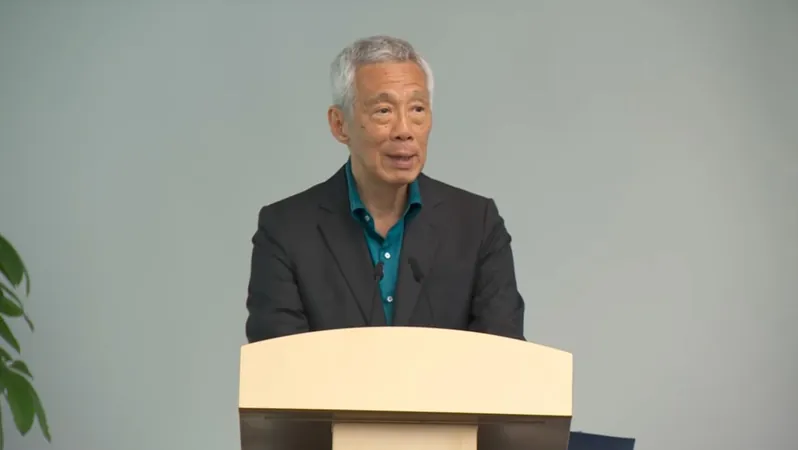
Japan's Rising Role as a Stabilizing Force in Southeast Asia: Senior Minister Lee Hsien Loong's Insight
2025-04-02
Author: Arjun
Japan's Valuable Stabilizing Role
In an increasingly unpredictable global landscape, Japan is poised to assume a "valuable stabilizing role" in Southeast Asia and the broader Asia-Pacific region. This assertion was made by Singapore's Senior Minister Lee Hsien Loong during the launch of the book *The Land of the Rising Sun and the Lion City: The Story of Japan and Singapore* at the National Library Building.
Growing Uncertainties
In his address, Mr. Lee highlighted the growing uncertainties surrounding long-held beliefs about defense alliances, nuclear deterrence, and non-proliferation. In this context, he believes Japan's involvement is crucial for fostering regional stability and, by extension, the prosperity of the Asia-Pacific. "That is why I advocated for Japan’s increased engagement in regional security during 2022 and again at the 2023 ASEAN-Japan Commemorative Summit," he stated.
Hope for Regional Stability
Mr. Lee expressed hope that both Japan and other Asian nations will exhibit the necessary wisdom and political leadership to cultivate friendships that ensure lasting peace and development across the region.
Japan's Engagement in Security Initiatives
Over the past decade, Japan has significantly ramped up its participation in regional security initiatives, beginning its engagement with the ASEAN Defence Ministers’ Meeting in 2014. By 2023, it had fortified its cooperation with ASEAN, focusing on critical areas such as maritime security, cyber defense, and nuclear disarmament.
Longstanding Partnership with Singapore
Japan is not only a longstanding ally of Singapore, having maintained a partnership for over fifty years, but the two nations also share common views on essential issues like the importance of a multilateral trading framework and a rules-based international order. Mr. Lee emphasized, "Singapore is, and will always be, a trusted partner for Japan in this collective effort."
Addressing Historical Sensitivities
On the topic of security cooperation, Mr. Lee acknowledged that historical sensitivities have previously complicated ties between Singapore and Japan, a legacy of World War II. "For those who experienced the war and the occupation, this topic was particularly challenging," he noted.
Progress Since World War II
Reflecting on the Fukuda Doctrine of 1977, which rejected a military role for Japan, Mr. Lee pointed out that even in 1991, when Japan participated in the Gulf War, there were widespread apprehensions in other Asian countries. However, Mr. Lee remarked on the progress that has been made since then.
Changing Perspectives in Japanese Society
The current generation is less burdened by the memories of wartime atrocities. Japanese society has evolved, with successive leaders working to bridge historical divides and promote trust across Asia. These efforts have included openly communicating Japan's security policies and demonstrating sensitivity to historical grievances.
Geopolitical Landscape and Security Strategies
As the geopolitical landscape shifts, Mr. Lee identified the pressing realities of three nuclear powers in the Asia-Pacific, excluding North Korea, along with intensified U.S.-China rivalry and tensions in crucial maritime areas like the Taiwan Strait, East China Sea, and South China Sea. He pointed out that these dynamics are prompting Southeast Asian nations to reevaluate their security strategies and deepen partnerships with Japan.
Conclusion: Japan's Role in Stabilizing Southeast Asia
Overall, with its growing engagement and commitment to regional peace, Japan stands at a critical juncture, ready to take on a more proactive role in stabilizing Southeast Asia in the face of 21st-century challenges.


 Brasil (PT)
Brasil (PT)
 Canada (EN)
Canada (EN)
 Chile (ES)
Chile (ES)
 Česko (CS)
Česko (CS)
 대한민국 (KO)
대한민국 (KO)
 España (ES)
España (ES)
 France (FR)
France (FR)
 Hong Kong (EN)
Hong Kong (EN)
 Italia (IT)
Italia (IT)
 日本 (JA)
日本 (JA)
 Magyarország (HU)
Magyarország (HU)
 Norge (NO)
Norge (NO)
 Polska (PL)
Polska (PL)
 Schweiz (DE)
Schweiz (DE)
 Singapore (EN)
Singapore (EN)
 Sverige (SV)
Sverige (SV)
 Suomi (FI)
Suomi (FI)
 Türkiye (TR)
Türkiye (TR)
 الإمارات العربية المتحدة (AR)
الإمارات العربية المتحدة (AR)